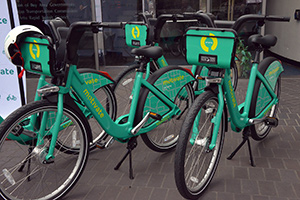Bay Area Bike Share will grow from 700 to 7,000 bikes by 2017 after the expansion proposal was approved by a unanimous vote of the Metropolitan Transportation Commission. It is a regional, not a city program, though most usage is in San Francisco.
The new operator of Bay Area Bike Share is Motivate, previously known as Alta Bicycle Share, which also operates the nation's largest bikeshare program, Citi Bike. "At a press conference following the [May 27] Commission action, Motivate unveiled the next generation of bike share bicycles [pictured below], which are specially built to withstand the elements and heavy use on all terrains," writes Brenda Kahn, Senior Public Information Officer at the Metropolitan Transportation Commission (MTC).
With the Commission's approval, the program now expands to the three East Bay cities of Oakland, Berkeley, and Emeryville. What was uncertain prior to the May 27 Commission meeting was whether it would remain in the three Peninsula cities where usage rates have been low.
Three West Bay cities that were part of the original pilot program but not included in Motivate’s expansion plans — Redwood City, Mountain View and Palo Alto — have the option to continue to participate under separate agreements with Motivate [although they can remain at no cost through June 2016.]
"Other cities in the region that want to participate in the regional bike share system can develop a service agreement with Motivate using their own sources of funds, according to a preset price, with the ability to secure sponsorships to cover the costs," writes Kahn, although "MTC is committing $4.5 million for capital costs" for expansion in those cities.
Under the public/private arrangement, the 7,000 bike program will operate with no financial support from the public sector, relying instead on member/use fees and [corporate] sponsorships.
Presumably the corporate sponsorships will allow for advertising on the bikes and the docking stations, as noted earlier. Currently neither have ads.
Wary of the demographic factors that show low income, nonwhite commuters are less likely to use bike share, Motivate will have a reduced membership fee for those who qualify.
An annual pass for Bike Share will start at no more than $149, with future adjustments pegged to inflation. Low income Bay Area residents will be eligible to purchase an annual pass at just 40 percent of the standard rate. Also in the area of equity, Motivate is required to place a minimum of 20 percent of its docks and bikes in communities of concern.
With the approval of the new contract, "(o)verall management of the program will transfer from the Bay Area Air Quality Management District to MTC," writes Kahn. So ends what must be considered a successful pilot project that was launched in August, 2013.
FULL STORY: MTC Gives Green Light to Major Bike Share Expansion

Maui's Vacation Rental Debate Turns Ugly
Verbal attacks, misinformation campaigns and fistfights plague a high-stakes debate to convert thousands of vacation rentals into long-term housing.

Planetizen Federal Action Tracker
A weekly monitor of how Trump’s orders and actions are impacting planners and planning in America.

Chicago’s Ghost Rails
Just beneath the surface of the modern city lie the remnants of its expansive early 20th-century streetcar system.

Bend, Oregon Zoning Reforms Prioritize Small-Scale Housing
The city altered its zoning code to allow multi-family housing and eliminated parking mandates citywide.

Amtrak Cutting Jobs, Funding to High-Speed Rail
The agency plans to cut 10 percent of its workforce and has confirmed it will not fund new high-speed rail projects.

LA Denies Basic Services to Unhoused Residents
The city has repeatedly failed to respond to requests for trash pickup at encampment sites, and eliminated a program that provided mobile showers and toilets.
Urban Design for Planners 1: Software Tools
This six-course series explores essential urban design concepts using open source software and equips planners with the tools they need to participate fully in the urban design process.
Planning for Universal Design
Learn the tools for implementing Universal Design in planning regulations.
planning NEXT
Appalachian Highlands Housing Partners
Mpact (founded as Rail~Volution)
City of Camden Redevelopment Agency
City of Astoria
City of Portland
City of Laramie



























